Lenin, Romanov, Kerensky, Mata Hari: Vote for #1917LIVE Person of the Year
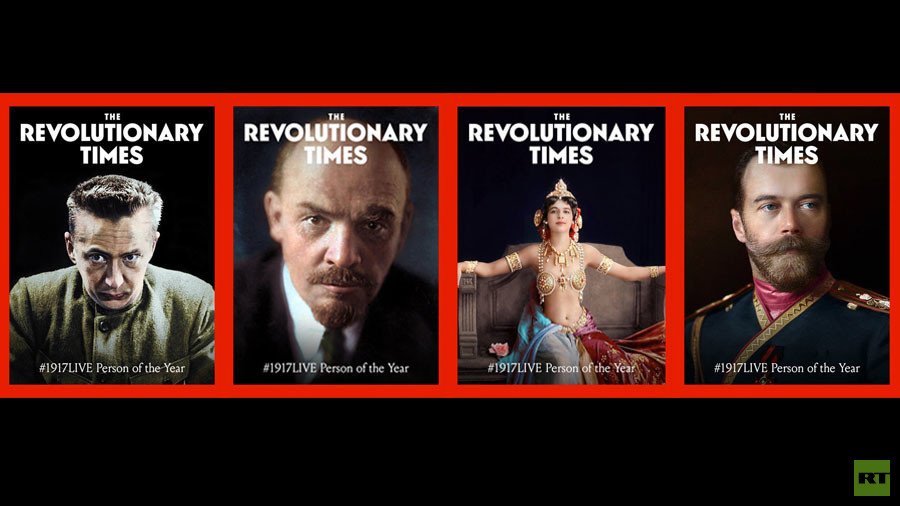
Choosing a Person of the Year is always risky, even more so when making a decision about who had the biggest impact on Russia in 1917. From Tsar Nicholas II and Vladimir Lenin to Mata Hari – in many ways, your pick will be a snapshot of history.
Don't forget to cast your vote.
Who is the Person of the Year 1917? VOTE for @NicholasII_1917@Kerensky_1917@VLenin_1917@Mata_Hari_1917#1917LIVE
— Revolutionary Times (@RT_1917) December 4, 2017
Nicholas II
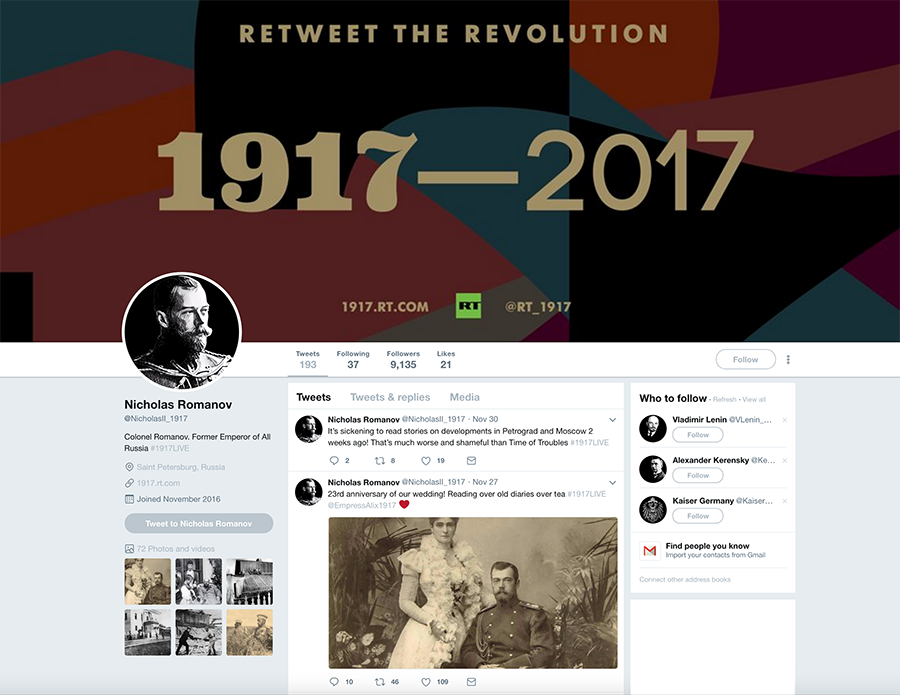
“All around me is treachery, cowardice and deceit,” Nicholas II writes in March 1917. The country is in disarray. The last vestiges of monarchic rule are about to be history. Bread shortages are on the rise, crime and looting are commonplace, while the notorious shuttering of the Putilov Factory leaves some 36,000 people without jobs. Russia, meanwhile, is still fighting a war nobody wants any part in. The monarchy has lost all sway with the Russian public, but Nicholas II has no plans to abdicate, believing he has a divine role to play in rescuing the country that blames him and his family for all its woes. But by March, the country has had enough. That fateful spring, the Revolutionaries, with their philosophy of the ‘black redistribution of land,’ reign supreme.
All around me there is treachery, cowardice and deceit #abdication#revolution#1917LIVE
— Nicholas Romanov (@NicholasII_1917) 15 марта 2017 г.
On March 15, Nicholas II abdicates in favor of his brother, Mikhail, who refuses the crown, bringing to an end three centuries of Romanov dynastic rule. The Russian monarchy is no more. Shortly thereafter Nicholas, his wife Alexandra and their five children are placed under guard at the Alexander palace in Tsarskoe Selo. The entire family, including the help, will be executed by a Bolshevik firing squad at a house in Ekaterinburg later in 1918.
Vladimir Lenin
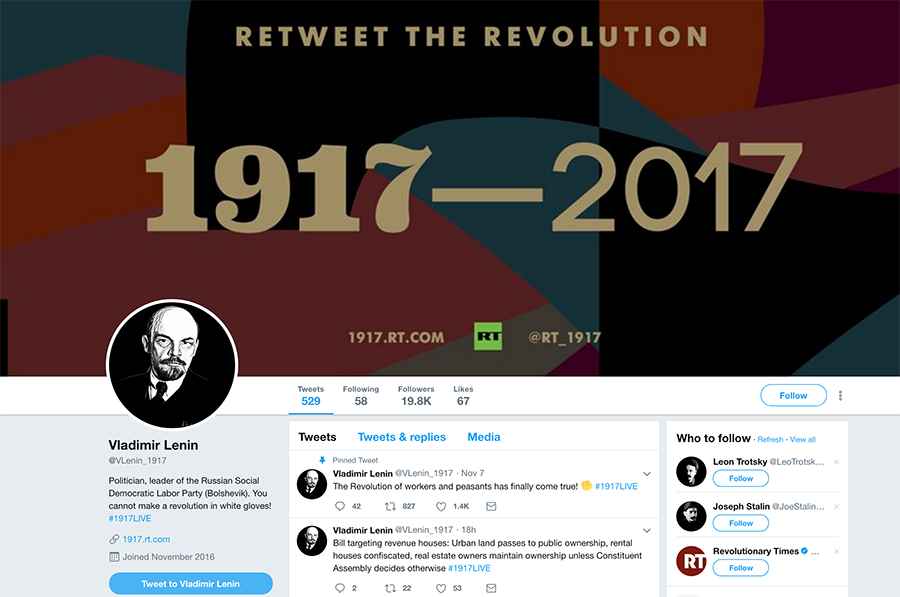
The father of the Russian Revolution, Vladimir Lenin played a quintessential role in the history of the 20th Century. Indeed, his political ideas still hold sway for many across the world. Lenin believed that the February Revolution that ousted Tsar Nicholas II, was bourgeois in its nature, and that more should have been done to upset the balance between the ruling classes and the world’s proletariat. He wanted a global Socialist revolution. A historic document, written by Lenin on November 7, 1917 (October 25 in the old Russian calendar), captioned and addressed “To the citizens of Russia”, finally proclaimed the overthrow of the provisional Russian government – following the rather bloodless October Revolution.
The Revolution of workers and peasants has finally come true! ✊ #1917LIVE
— Vladimir Lenin (@VLenin_1917) 7 ноября 2017 г.
It also announced that “state power has passed into the hands of the organ of the Petrograd Soviet of Workers' and Soldiers' Deputies, the Revolutionary Military Committee, which heads the Petrograd proletariat and the garrison.”
Soldiers! Keep order, prevent unrest, do not allow generals to interfere in peace initiatives. Final peace treaty to be signed by SovNarKom #1917LIVE
— Vladimir Lenin (@VLenin_1917) 22 ноября 2017 г.
The document read that “the cause for which the people have fought, namely, the immediate offer of a democratic peace, the abolition of landed proprietorship, workers' control over production, and the establishment of Soviet power”, has been secured. “Long live the revolution of workers, soldiers and peasants!” it proclaimed. The Bolsheviks then set about re-modelling all institutions to fit their policies, starting work on a new Constitution.
Bourgeoisie creates atmosphere of deception and defamation, believes it isolated us. But both soldiers and peasants applaud our decrees on peace and land #1917LIVE
— Vladimir Lenin (@VLenin_1917) 17 ноября 2017 г.
Alexander Kerensky
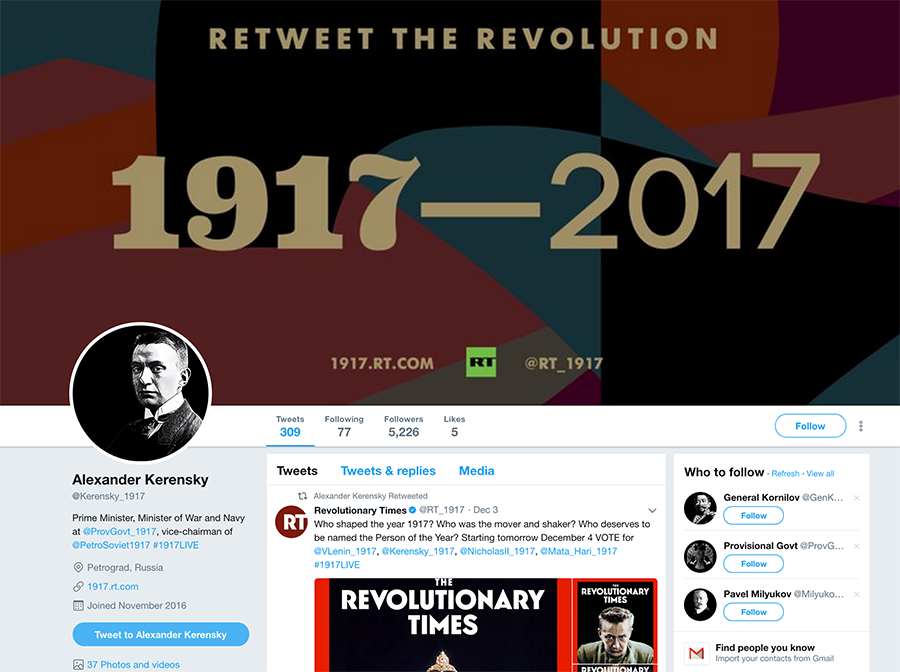
When the monarchy was overthrown over the course of the February Revolution, Alexander Kerensky, a charismatic politician and public speaker, rose to power.
Junkers in #Petrograd were too quick to rebel! Pushing to to Petrograd to strike against Bolsheviks! #1917LIVE
— Alexander Kerensky (@Kerensky_1917) 11 ноября 2017 г.
In March 1917 Kerensky, a lawyer by trade, became Minister of Justice, later also becoming Minister of War, and ordering an offensive against the Austro-Hungarian/German South Army. Russia suffered heavy losses, and after a short period of gains the military operation ended in failure. In July, Kerensky became Russia’s Prime Minister, but then lost power to the Bolsheviks during the October Revolution in 1917, and was forced to spend the remainder of his life in exile in the West.
I believe I’ll stay Commander-in-Chief until Russian Republic’s government decides otherwise #1917LIVEpic.twitter.com/ryDDFSJ68N
— Alexander Kerensky (@Kerensky_1917) 8 ноября 2017 г.
Mata Hari
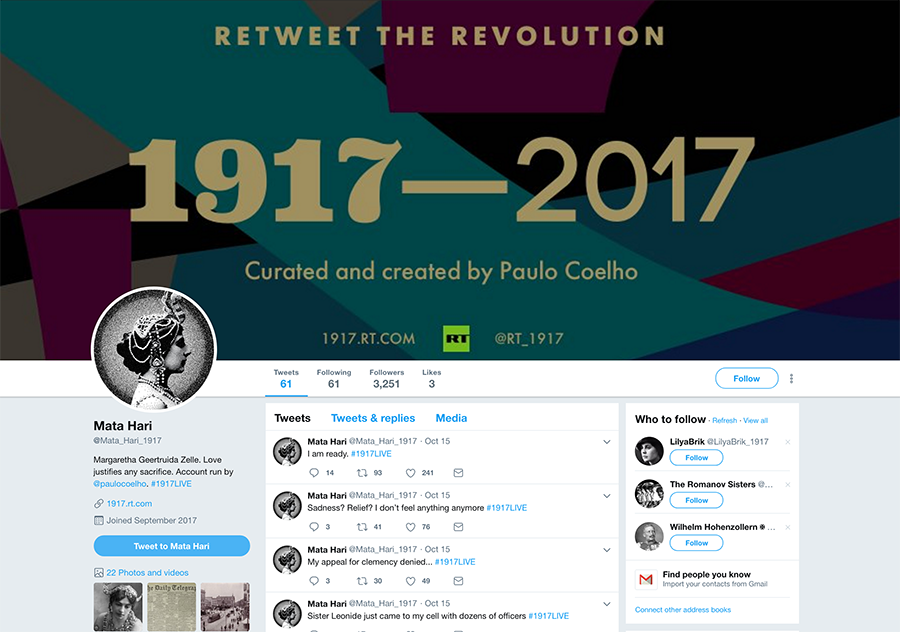
“I don’t need to fight anymore, only wait for people I’ve never met to decide who I am,” Mata Hari, the exotic dancer accused of being a German spy, once famously said. To this day historians disagree over who Margaretha Geertruida Zelle, aka Mata Hari, really was: a temptress full of feminine charm and sexual magnetism who manipulated her lovers, or just a trusting woman-child in the hands of dishonest and powerful men.
I don’t need to fight anymore, only wait for people I’ve never met to decide who I am #1917LIVEpic.twitter.com/DJ7iPrnspX
— Mata Hari (@Mata_Hari_1917) 14 октября 2017 г.
On 13 February 1917, the charismatic femme fatale was arrested in Paris, convicted of being a spy for Germany, and executed in October.
All my life I’ve thought and acted like Mata Hari, woman who has been and always will be fascination of men and envy of women #1917LIVEpic.twitter.com/AoCDXD2Zvx
— Mata Hari (@Mata_Hari_1917) 13 октября 2017 г.
RT’s international #1917LIVE Twitter project, a large-scale historical re-enactment that marks the 100th anniversary of the Russian Revolution by recreating the events in real time, won 'Best in Education' at the Shorty Social Good Awards, surpassing 25 other entries which included Google and Verizon. The Shorty Social Good Awards is a prestigious competition dedicated to honoring social media efforts that positively impact society.
RT launched one of the biggest historical re-enactments on Twitter ever in late 2016. Brought together under a fictional media outlet feed called The Revolutionary Times (what was known as the Russian Telegraph before the November 7 takeover), the trailblazing project revolves around dozens of Twitter accounts set up as key historical characters of the time period, from the last Russian tsar, Nicholas II, and Bolshevik leader Vladimir Lenin, to common workers and soldiers. The project boasts a series of specially produced promos, recreating an array of events that took place 100 years ago, such as the abdication of Nicholas II, the starvation in Petrograd, and Lenin’s famous speech.
As part of the #1917LIVE project, RT filmed an eight-part “Revolution 360” series, with each episode telling a different story of life in the period in 360 degrees—from the trenches of World War I to the tumultuous streets of the capital.
Prominent historians and authors from the US and UK have taken part in the project, including revered Brazilian novelist Paulo Coelho (The Alchemist and Veronika Decides to Die.)












